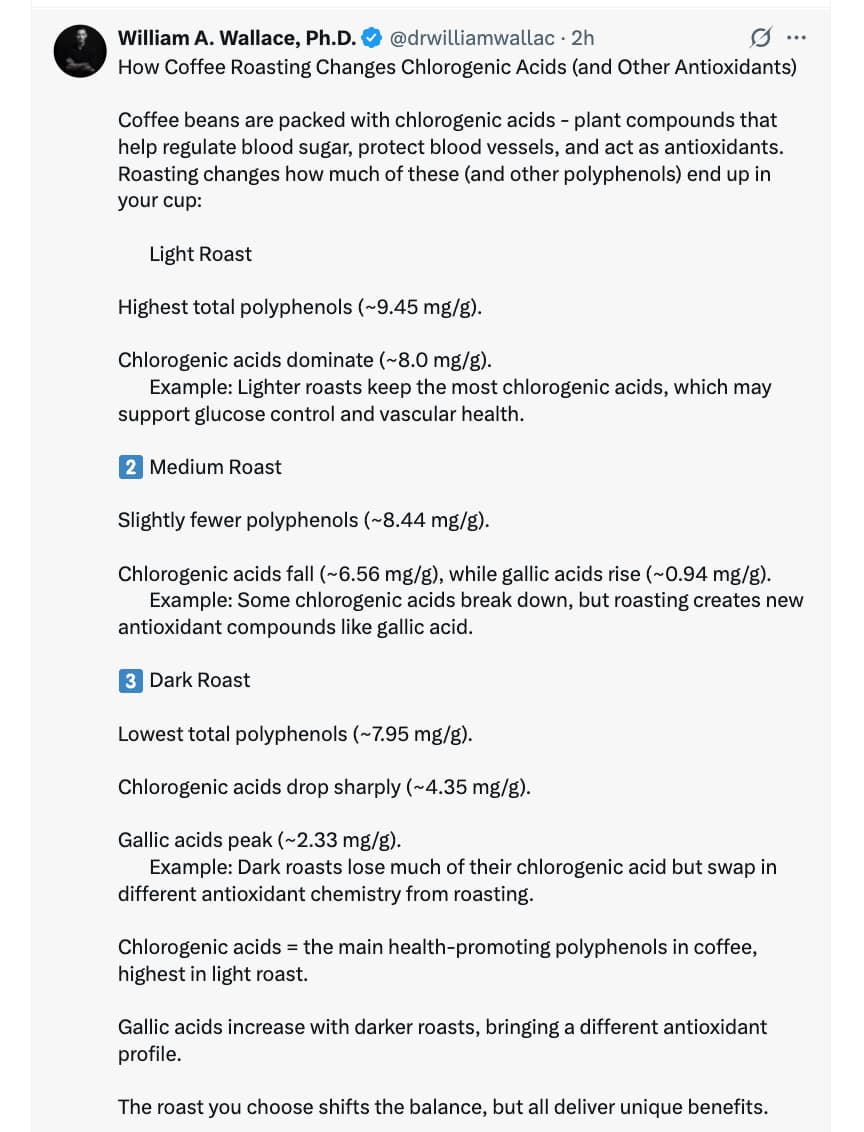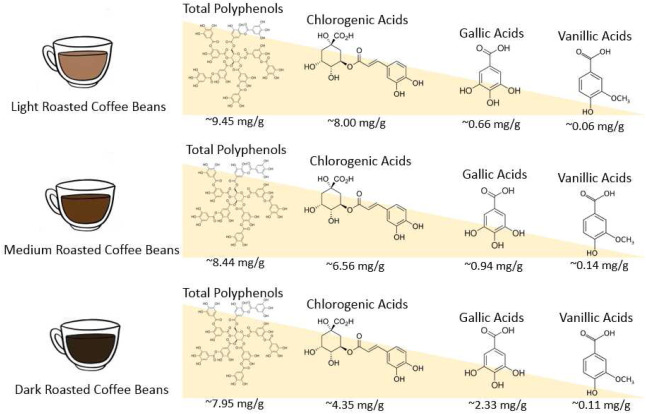Good idea. It will be hard. Pollan tried to only have his coffee (espresso) on sundays to preserve the amazing feeling he got from being caffeine naive. He couldn’t contain it. His brain found all sorts of ways to get him to drink coffee. I believe he still tries to drink green tea as a distraction (ala methadone) from coffee some of the time
Update. Since quitting coffee about 2 weeks ago my sleep is much better. I have done other things so there is some confounding but I’m very happy with the results. I wake up feeling refreshed for the first time in memory.
Last night I slept for 9.5 hours. I had a 9.5 hour night last week too. I haven’t slept more than 8 hours in years, I’m pretty sure; but certainly I haven’t had two in 7 days.
The other things I’ve done:
(1) lights out in house at sundown except for dimmed incandescent bulbs by my sitting chair; thanks Scott Zimmerman and Nira Lighting
(2) sitting under NIR lamp and bulbs for several hours in AM (before gym opens)
(3) HRV biofeedback at night
(4) all electronics off at 8pm; I can read a real book as much as I want (very dim light)
(5) no eating after 7pm; no large meal after 5pm (mostly that means I eat a small dinnner now)
(6) no melatonin before sleep; I take 10mg when I get up at 2am (+-) to pee; idea from John Henning
Coffee is dead to me.
All of these seem sensible, and sleep is critical to longevity, so good on you for taking care of that, congrats. Regarding coffee, as you know, there are the fast and slow metabolizers, the latter seem to derive less if any benefit. You can check to see if you are a slow metabolizer. If you are a fast metabolizer, and drink coffee only in the morning, you may still be able to enjoy the benefits without affecting your sleep - in any case there’s research showing that drinking coffee in the morning is better in any case. The other thing is that if it is the caffeine that is the problem, you can always switch to decaf - research seems to indicate that you get most of the coffee benefits from decaf too. However, if you want to avoid coffee altogether, I get it.
There are slow and fast metabolizers of caffeine. I found out long ago that I am a fast metabolizer. I can drink as much coffee as I want until about 5 pm without it affecting my sleep.
When it comes to sleep protocols, one size doesn’t fit all.
I also question the blue light hypothesis. I have noticed no appreciable effect.
My sleep protocol consists mainly of always going to bed at the same time and rising at the same time every day. I take melatonin 2 hrs before bedtime to set the biological sleep cycle for the time I go to bed. I don’t understand John’s rationale for taking melatonin if you wake up during the night because all of the literature I have read says it only adjusts the sleep cycle it does not per se make you sleepy. The only times I wake up during the night and cannot go right back to sleep is if something has caused me to be upset or worried. In that case, I take trazodone to go back to sleep.
“The metabolism of caffeine is primarily influenced by genetic variations in the CYP1A2 gene, which encodes the enzyme responsible for metabolizing caffeine. Individuals can be categorized as either “slow” or “fast” caffeine metabolizers based on their CYP1A2 genotype. Specifically, the rs762551 polymorphism in the CYP1A2 gene is a well-studied variant that affects caffeine metabolism. Carriers of the C allele (AC or CC genotypes) are considered slow metabolizers, while those with the AA genotype are fast metabolizers.[1-3]”
“Understanding whether one is a slow or fast metabolizer of caffeine can help individuals make more informed decisions about their caffeine consumption and its potential health impacts.”
If I read the article and chart correctly, only about 12% of Americans are slow metabolizers.
That is why such a large number of Americans drink coffee and don’t complain that it affects their sleep.
Sleep cycles are HPA cycles. Melatonin inhibits cortisol. Cortisol wakes you up. Hence when you run out of melatonin from the CSF you wake. You need to get the autonomous nervous system into the parasympathetic state for which both melatonin and breathing exercises are a tool.
When you take your coffee is also important.
2-3 cups in the morning reduces ACM.
2-3 cups during the day does not.
- Published: 30 April 2025
Caffeine induces age-dependent increases in brain complexity and criticality during sleep
AI summary of video above:
- No Link to Breast or Colon Cancer: Studies show no association between coffee consumption and increased risk for these cancers.
- Liver Cancer Protection: Coffee may offer protective effects, especially for non-alcoholics who consume it regularly.
- Historical Misconceptions: Earlier studies suggested links to bladder and lung cancer, likely due to confounding factors like smoking habits among coffee drinkers.
- Temperature Matters: Drinking very hot beverages may increase esophageal cancer risk, independent of coffee itself.
- Caffeinated vs. Decaf: Some comments suggest caffeinated coffee might be safer due to the chemical processes used in decaffeination.
- Additives Impact: Dairy creamers may reduce coffee’s antioxidant benefits.
I split a caffeine tablet in half to get a precise 100 mg per day. Any more than that irritates the bladder lining.
To reduce antioxidant effects with sugar or cream - try salt! I know salt has its own issues - but since I am on Jardiance, not an issue.
Sure… but does it make us live longer?
The world’s priciest coffee comes from a civet’s poop. Here’s why it tastes so good.
Hmmm…so I am thinking…what does a civet’s digestive system have that I don’t? Mammals are mammals…
The resulting coffee is so prized that the beans may cost $600 to $1,300 a pound — a price tag that has led to concerns about civet captivity and animal welfare in some civet coffee farms
What if I ingest coffee beans and collect them later… lol.
Just thinking right now. No N=1 to share…
yet.
I’m sure that someone somewhere has already tried that. And if it was any good, we’d be drinking it by now.
But, who knows?
Guess I won’t be swallowing coffee beans… read on!
AI Overview
While humans cannot replicate civet digestion internally, scientists and food companies have developed external methods to mimic the process and produce similar “animal-free” coffee. The fundamental differences between the human and civet digestive systems mean a person cannot simply consume coffee berries and have the same outcome.
Key differences between civet and human digestion
The unique traits of the civet’s digestive tract are what produce the distinct flavor of kopi luwak (civet coffee).
| Feature | Civet digestive tract | Human digestive tract |
|---|---|---|
| Digestion speed | The civet’s gut passage time is relatively fast, under 9 hours. | Human digestion is much slower. |
| Key enzymes | Digestive enzymes in the civet’s stomach break down proteins in the coffee beans that contribute to bitterness. Research also shows that specific bacteria, such as Gluconobacter, are highly abundant in the civet’s gut and play a key role in fermentation. | The human digestive system metabolizes caffeine primarily through the liver enzyme CYP1A2, which affects the caffeine itself, not the bean proteins. Humans do not possess the same mix of enzymes and gut microbes to perform the crucial fermentation process that modifies the beans. |
| Aromatic compounds | The civet’s digestive process significantly alters the chemical composition of the beans, yielding a different profile of fats and flavor-enhancing compounds. | The human system is not designed to ferment and modify the coffee beans in this way. The beans would likely be excreted intact but without the unique fermentation effect. |
| Ethical concerns | Consuming coffee processed by a civet encourages the inhumane practice of keeping the animals in captivity and force-feeding them. For this reason, many companies and animal rights groups actively discourage purchasing civet coffee. | While a human could conceivably consume and excrete coffee cherries, it is neither practical nor sanitary. Furthermore, a human digestive tract would not produce the desired flavor outcome. |
It is neither practical nor sanitary. Furthermore, a human digestive tract would not produce the desired flavor outcome.
While on the topic of ![]() poop…
poop…
Why does pooping feel so good? | Live Science
I already mentioned a while back about an article on defecation before gym workout. Have found this a real plus.
Good news for coffee drinkers. Caffeinated coffee reduces atrial fibrillation.
How great is coffee consumption. Worth 5 extra years.
There’s this:
But, you dont have to be crazy to get the benefit.
Read nurses study below… 2016.
https://www.sciencedirect.com/science/article/pii/S002231662300651X


